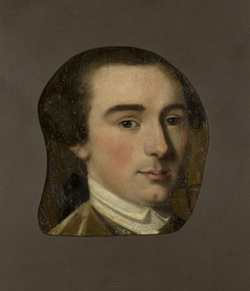Honoring Massachusetts’s First Provincial Congress
The congress carefully didn’t claim to be that official legislature. It gave some of its officers different titles, for instance. John Hancock was president instead of speaker, and Henry Gardner was receiver instead of treasurer. (Benjamin Lincoln was still clerk.)
The Provincial Congress also couched its acts as recommendations to the towns instead of requirements. Thus, it was up to the towns to decide to send their tax revenue to Gardner instead of to royal treasurer Harrison Gray. It was up to the towns to reorganize their militia companies, which is why some towns formed minute companies, others didn’t, and the terms for those companies’ training were different.
Nonetheless, this was a big and unmistakable step toward self-government. The congress was the de facto government of Massachusetts until July 1775, when a newly elected General Court took over, acting as if the governor was absent (instead of holed up inside besieged Boston).
Next week we’ll see two commemorations of the first convening of the Massachusetts Provincial Congress, on the 250th anniversaries of the inaugural session in Salem and the day when a larger group got down to business in the Concord meetinghouse (shown above, as rendered by Ralph Earl and Amos Doolittle).
Monday, 7 October, 6:00 to 8:00 P.M.
250th Anniversary of the First Massachusetts Provincial Congress
Hawthorne Hotel, Salem
Essex Heritage is the main host of this event. The program promises:
- welcome remarks from Jonathan Lane, executive director of Revolution 250 Massachusetts.
- brief lecture on the significance of the date by local historian Alexander Cain.
- presentation of federal, state, and local citations commemorating the bravery of those who met at Salem in 1774.
- keynote address by Robert A. Gross, author of The Minutemen and Their World.
- brief question-and-answer session with the speakers.
Friday, 11 October, 9:30 A.M. to 4:30 P.M.
The 2024 Massachusetts Provincial Congress: “Exploring Democracy—Our Rights and Our Responsibilities”
First Parish and the Wright Tavern, Concord
The featured speakers will be four noted scholars:
- Robert A. Gross
- Woody Holton
- Manisha Sinha
- Lawrence Lessig




